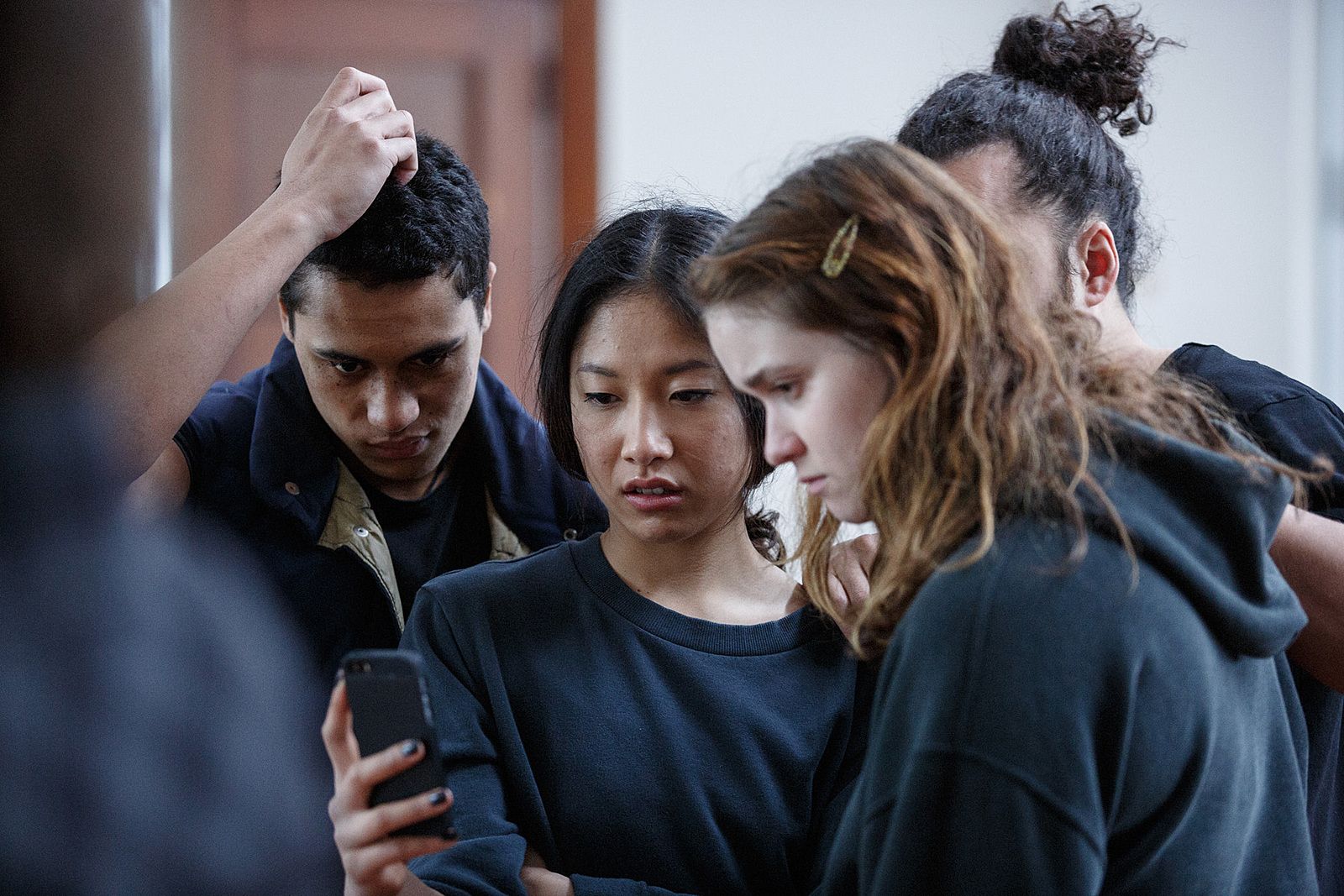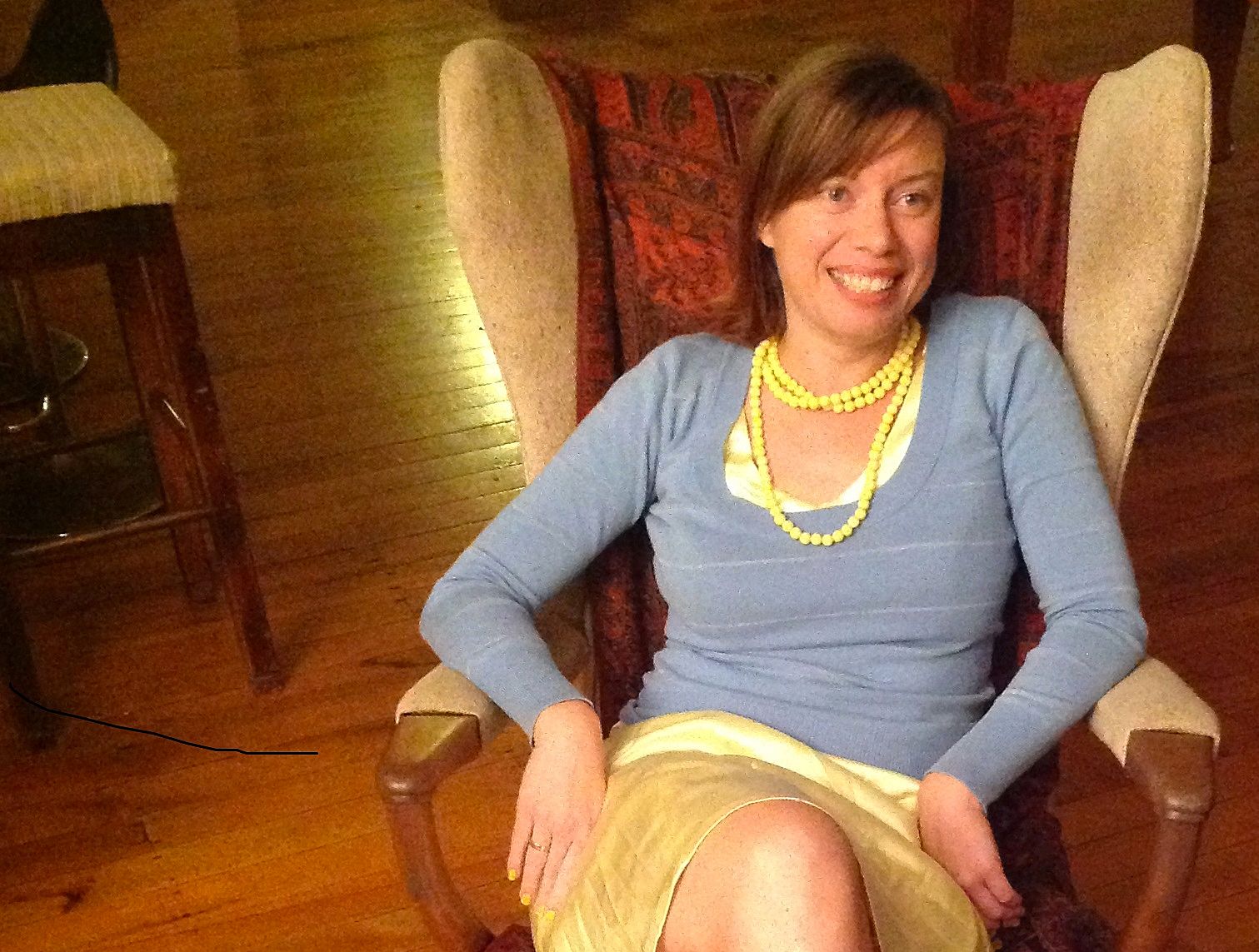I read the book first #sorrynotsorry
Janet McAllister rewrites The Rehearsal
Janet McAllister rewrites The Rehearsal
At The Rehearsal’s Q&A session, script co-writer Emily Perkins (yes, novelist-in-her-own-right Emily Perkins) said she felt like the film’s writing didn’t stop with the script. Channelling Roland 'Death of the Author' Barthes, she said the writing of The Rehearsal was continued by the directing, by the editing, and then by the audience during the screening.
Maybe the writing didn’t even stop there. Maybe it didn’t stop when we all performed the local film ritual of looking for all the names we know in the credits. Maybe I’m continuing to write my own version of The Rehearsal as I write this report on the Q&A session of the film of the book of the sensibility* of my youth.
*‘Sensibility’ rather than ‘story’ partially because the film’s plot is a sexy-bed-hair-wannabe cowlick that points wildly in several directions rather than sticking to a neatly-gelled narrative; but also because the film does a fine job of evoking the pot-fuelled intellectual excitement of discovering obscure Armenian films while shivering with cocky delight in the company of other sexy young things on the crumbling verandas of bracingly drafty villas haphazardly decorated with scrappy bits of poster. Oh to be an undergraduate again!
The book
Like a good little reviewer, I read Eleanor Catton’s enjoyable and amusingly cynical source novel before I saw the film, and now I can’t unread it, so you’ll have to go elsewhere if you want a review uninformed by this extraordinary book. It follows Isolde and a few schoolmates as she deals with the gossipy, prurient, shocked fallout of her sister Victoria’s sexual relationship with a music teacher at their school – as well as exploring romantic possibilities of her own (not all of them straight); and it follows Stanley and his drama school mates as they devise a show based on Victoria’s scandal.
Sex, a bit of death and the power dynamics between young and old(er) – Catton’s The Rehearsal is in the grand tradition of The Prime of Miss Jean Brodie, with the addition of some clever handling of the blurry divide between life and acting, between reality and projection. It is bold.
The Q&A
The filmmakers said they wanted their film to be bold. They said James Rolleston deliberately endangered his own phone during the shooting, and they were blown away by such actorly commitment.
They didn’t say, but they could have, that a film about the blurry divide between life and acting has an advantage over its source novel if it wants to be bold. Such a film involves people acting acting. You could play with that – you wouldn’t have to even go all meta like Steve Coogan in Michael Winterbottom’s Tristram Shandy; just a wink would do.
They didn’t say, but they could have, that Kerry Fox – who does a brilliant job of playing Hannah, the fierce silver-haired drama head – knows about presenting the overlap between life and acting better than most. The fact she’s known for far, far more than her unsimulated fellatio in Intimacy (2001) is testament to the strength, boldness and commitment of the rest of her body of work.
The film
In spite of these promising materials, the film just isn’t that bold. It doesn’t play with form, it doesn’t play with time, it barely waves its hand at the book’s powerful feminine-sexuality thread.
the film just isn’t that bold. It doesn’t play with form, it doesn’t play with time, it barely waves its hand at the book’s powerful feminine-sexuality thread.
Instead, the film flips the book’s overt ironies into generic clichés and concentrates on Stanley’s coming of age. Flat Stanley! Bad things happen to people off-screen and we’re stuck following a member of the on-screen Greek chorus.
The Q&A
An audience member introduced himself as an 'LA scriptwriter' (aka semi-retired Waiheke winemaker Chris Canning) and in the most friendly way he described how he felt that Stanley was cardboard and didn’t really seem to develop either in plot A or plot B, and could the writers please explain what they saw as Stanley’s trajectory?
Put on the spot, they couldn’t really. But then again, it wasn’t an LA film.
Later the filmmakers said they saw a drama-school scene where Stanley plays his own father as essential to the story. It would have been good if the film had spelled it out like the book does: this is part of the eponymous rehearsal – adolescence as practice for adulthood.
The film
Perhaps the film’s boldest move is to avoid expected explanations, to keep Chekov’s Gun unshot and unsmoking. It’s hinted that Isolde narked on her sister’s liaison (with a world-famous-in-NZ tennis coach rather than a music teacher). So why doesn’t her sister Victoria seem to care? We never find out. A broader lack of explanation means the film doesn’t signal what’s at stake for the main characters. A good mark on the end-of-year assignment? Is that what we’re supposed to care about?
As a fellow filmgoer put it: “I never got out of second gear.”
(To be fair, the film does wink: to New Zealand audiences at least. Former Toi Whakaari head of acting Miranda Harcourt plays a drama teacher in a kimono. There’s an expensive new theatre opening on the waterfront. And there’s restructuring unhappiness at the Drama Institute – the Institute scenes were shot at Unitec.)
The Q&A
Emily Perkins said that she and co-writer/director Alison Maclean thought up a most outrageous ending for the film, which had them both in fits of giggles and helped to establish trust between them. When an audience member asked what that alternative ending was, they wouldn’t say. “It will go with me to my grave,” declared Emily Perkins.
Too polite to say!
I have my suspicions as to what that oh-so-too-bold ending involved.
The film
I also have a theory the film really wants to be a music video. After all, it features great ambiance and dream logic and Marlon Williams in a charismatic cameo, actually and gratuitously singing in front of an audience. There are tracking shots following teenage girls through the tennis courts (let’s talk it up like yeah. Yeah).
And the film really is beautiful. At the Q&A, Maclean said she was pleased to be able to work with Andrew Commis as Director of Photography because she likes the way he lights things. The drama school scenes have an intense fluorescence; Isolde and Victoria’s world of tennis courts and high walls is also bright and uber-healthy, like an ad for toothpaste or tampons. When Stanley brings his flatmate William to Isolde’s house, it’s like he’s brought Peanuts’ Pigpen into a Homes and Gardens spread – you can see his world infecting hers. And as already indicated, Stanley and William’s dimly yellow-lit nocturnal home feels both authentic and idealised, familiar and wonderful. (It’s where I’d feel most comfortable.)
Kieran Charnock is utterly believable as slightly dweeby William, while Michelle Ny has great charisma which leaps straight off the screen. Making up Stanley’s drama gang, Scotty Cotter and Jane Campion’s daughter Alice Englert are underused (in spite of Englert’s high billing). Erroll Shand sports a wonderfully creepy slick blond ponytail as tennis coach Saladin.
But the revelation is Ella Edward as Isolde. The character fits into the venerable history in New Zealand film of the wise girl-child (there are similarities with Emily Barclay’s character in In My Father’s Den) and as played by Edward, Isolde is poised, with an open face, both childlike and womanly, great for such an ambiguous role.
The book
A character rails against the grooming of girls for victimhood.
The film
Isolde isn’t one for victimhood or passivity or sweet nothings or avoiding responsibility. Very wise indeed.
Meanwhile, Rolleston does a good job as Stanley although the character does seem reasonably passive. It’s great to see a film making a role Māori where originally it wasn’t specifically written to be Māori – but even better, Stanley (arguably) isn’t made to act 'white' and the world he inhabits even in Auckland isn’t wholly white. That is, the people around him aren’t all white and the institutional feel of the Drama Institute isn’t wholly Pakeha-driven either: the first few drama classes involve call-and-response in te reo. We don’t know Stanley’s cultural background (he comes from Whakatane and wears pounamu) but thanks to the Drama Institute’s bicultural vibe, the lack of this information doesn’t feel like an avoidance or a passing (to me, at least).
And it was also great to see an Asian woman in a reasonably large role, although the first time we see Ny, who is of Khmer Cambodian descent, she's in a blonde wig, high heels and short skirt, parodying the tennis 'Lolita of the Suburbs’ stereotype, and in general she seems to spend an inordinate amount of time in hot pants. (Pantograph Punch editor Rosabel Tan disagrees that Ny’s character was especially sexualised, so perhaps I just wanted to work in a reference to Roseanne Liang’s brilliant 2007 short “Take 3”.)
The end
Ahoy! Spoilers ahead!
The book: leaves the ending open; on an initial skim read it seems like the school-for-scandal show does go ahead, with Isolde and her family in the audience. But it’s unclear.
The film: Stanley shuts down the tennis match before it gets on stage, and the theatrical happening that takes place instead is a metaphor for rebirth or passing into adulthood or climbing back into the womb or whatever. I guess, in its favour, it is extremely believable as the choice of undirected first-years. But the fact that Isolde and Stanley pass through to the other side at the same time makes me feel like we’re supposed to be invested in this rocky teenage romance and hope they’ll be togetha 4eva. Argh! (As for William’s fate, what an ersatz event, a bolt-on piece of artificial nonsense. Tragedy, in Catton’s book, begets self-important behaviour which is there to be sneered at. But in the film, the presentation of the reactions of the rest of the gang is as brief as possible and paint-by-numbers. What was the point? The film would have been deeper without it.)
The Q&A: I suspect that the filmmakers’ giggle-inducing, stay-with-me-to-my-grave, immediately-rejected ending involved getting Kerry Fox to reenact the Intimacy fellatio at the end-of-year Institute show. Would that really be so laughable and no-go? Maybe I’m wrong; maybe they thought up something genuinely outrageous. Whatever it was, if they really wanted to be bold, they should have kept it.
The fan fic film: Isolde and her family are in the audience. The tennis scandal show does go ahead – because Stanley always planned it to do so. He turns out to be the anti-hero – his outward passivity turns out to be him just holding his cards close to his chest. His rehearsing of his father was more than skin deep, and he’s learned Hannah’s Institute lesson all too well: acting is hard work and risky and he’s out to win her respect by sacrificing everything to get the show. This is the reason we’ve been following him – he’s not a chorus member, he’s the covert orchestrator, the manipulator. We as audience feel foolish for believing in him for so long. It was so obvious but we didn’t want to believe it.
And Isolde? Does she feel foolish too? Perhaps Stanley was pumping her for information while deliberately keeping her in the dark, perhaps we see her poise crumble. Perhaps she’s a victim after all.
Or perhaps she’s been in it with him since the beginning, and the show is her revenge on Victoria, her parents, tennis – the lot of them. Possibly with serious consequences that she, in her youth, couldn’t foresee…
I’ll leave that rewriting up to you.
Elsewhere: Brannavan Gnanalingam chats to Alison Maclean about adapting 'unadaptable' novels
The Rehearsal is at the New Zealand International Film Festival


